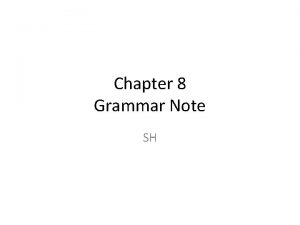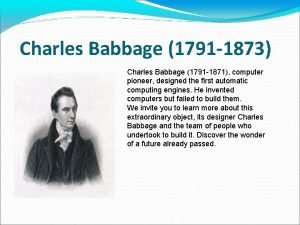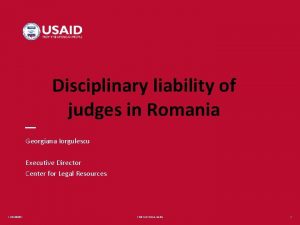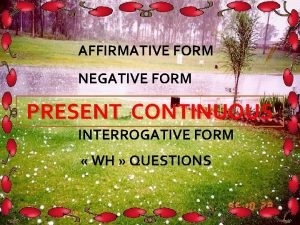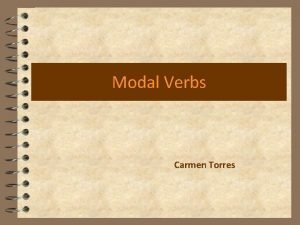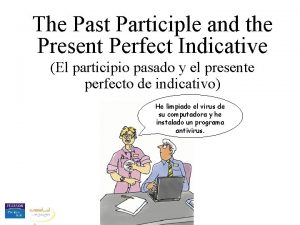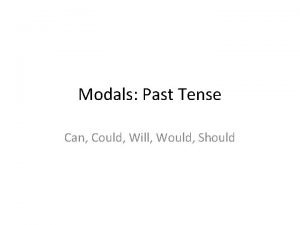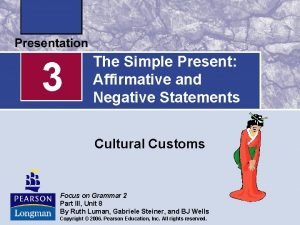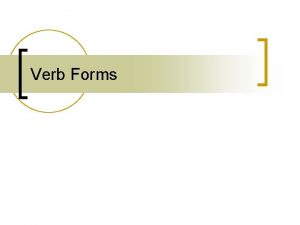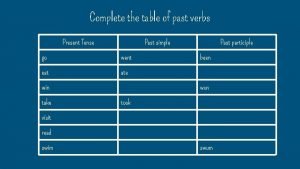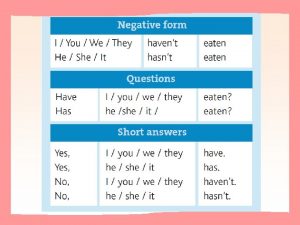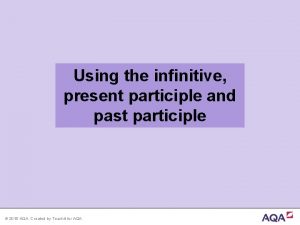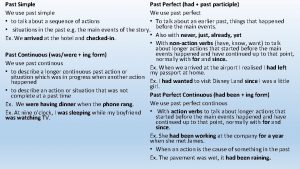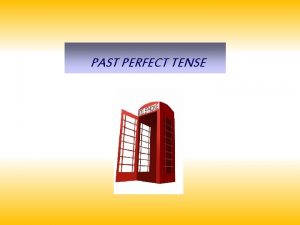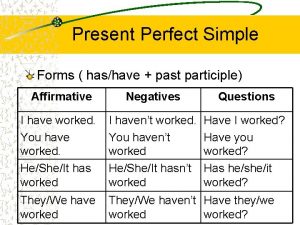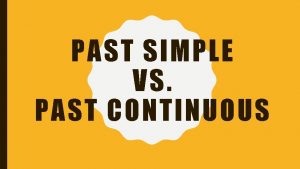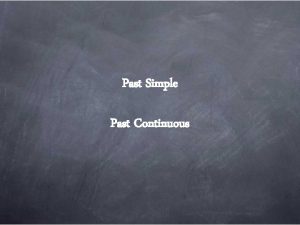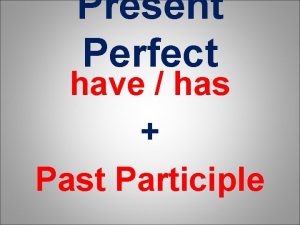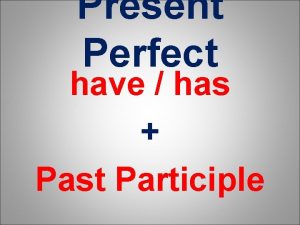Professora Georgiana FORM have has past participle Affirmative
















- Slides: 16

Professora Georgiana

FORM: have / has + past participle Affirmative: I have seen the film before. She has seen the film before.

Negative: They haven’t seen the film before. He hasn’t seen the film before.

? ? ? Interrogative: Have you seen the film before? Has she seen the film before? ?

Past participle verb forms must be learned because they don’t follow any rule: Go Come Buy Drink Eat Find See Gone Come Bought Drunk Eaten Found Seen

to become to bring to build to buy to catch to drive to eat to fight to fly to forget become brought built bought caught driven eaten fought flown forgotten to get to give to go to have to know to make to ride to sit to sleep to gotten to given to gone to had to known to made to ridden to sat to slept

Uses of the present perfect 1 - Recent events: It is used to describe recent events without a definite time. A time expression may emphasize recentness: just, recently, lately Why are they so happy? They have just won a prize so they are really pleased

2 - Personal experiences: It is used to express personal experiences, there is not a definite time given. The time expressions ever and never are very often used with this meaning I have never been to Japan. Have you ever been there?

3 - It is used to express actions that started in the past and continue to the present, the time period is not finished. We use for and since with this meaning. I haven’t eaten since yesterday morning. I am really hungry I haven’t drunk anything for two days. I am terribly thirsty

We use definite expressions with the Past simple tense: yesterday, last week, … ago etc, while we don’t use definite time expressions with the Present perfect tense. I have been to France three times When did you go there last? I went there last Summer

Gerald has bought a new car. He bought it last week. Have you met Ray? – Yes, I met him when we were students. My parents have been to India. In fact, they went there twice last year.

He has been to London. Now he is here. He can tell you wonderful stories about London. He has been in London for two weeks. He is still in London. Where’s Peter? He has gone to London. He is in Italy or on his way to London.

Answer the questions. Use short answers. Have you ever been to Canada? I have Yes, ______. Has Jane ever cooked Thai food? she hasn’t No, ______. Have Li Mang and Xiu ever written poetry? they have Yes, ______. Has Cesar ever read an English newspaper? he has Yes, ______. Has Julio ever fallen asleep in class? he hasn’t No, ______. Have Ramon and Sancho ever driven a car? they have No, ______.

Complete the sentences. Use the present perfect. My friends _____ have gone (go) to Europe twice. We ______ have traveled (travel) by plane lots of times. Rob _____ has gone (go) on a blind date. Martha _____ has done (do) karate. I ______ have dyied (dye) my hair three times. Kerry ______ (eat) insects in Thailand. has eaten William _____ has ridden (ride) a camel in Egypt. My parents ______ have swum (swim) in the Indian Ocean.

Circle the correct past participle. Talk Fall Go Break Wear Do Be talked / talken fell / fallen went/ gone breaked / broken worn / wore done / did was/ been

Write sentences in the present perfect. Use already, just, and yet. She / win the lotto (already) She has already won the lotto _______________. He / tell a lie (just) He has just told a lie _______________. I / not visit Europe (yet) I haven’t visited Europe yet _______________. They / start the exam (already) They have already started the exam _______________. I / make a mistake (just) I have just made a mistake _______________. We / not have dinner (yet) We haven’t had dinner yet _______________.
 Past participle of tear
Past participle of tear Past perfect would have
Past perfect would have Forgive simple past
Forgive simple past Charles babbage
Charles babbage Charles babbage georgiana whitmore
Charles babbage georgiana whitmore Georgiana iorgulescu
Georgiana iorgulescu Present continuous affirmative form
Present continuous affirmative form Past perfect affirmative
Past perfect affirmative Present participle
Present participle Single concept modal
Single concept modal Past perfect indicative
Past perfect indicative Catch past tense
Catch past tense Present simple: affirmative
Present simple: affirmative Past participle past
Past participle past Past perfect endings
Past perfect endings Simple past tense table
Simple past tense table Past perfect tense progressive
Past perfect tense progressive
